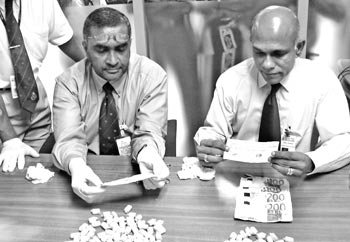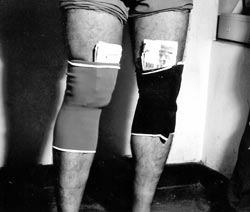
|
Treasury in the tummy Huge currency smuggling racket: Two men nabbed at BIA with thumping Rs. 20 million in their stomachs Two sarong-clad men posing as Indian businessmen hurriedly entered the Bandaranaike International Airport to board a SriLankan flight bound for Singapore last week. But their journey was abruptly halted by Customs officials who placed them under surveillance on a tip off. Little did the officials know then that they had stumbled on the biggest ever case of smuggling foreign currency and travellers cheques out of the country. Both suspects had swallowed foreign currency and travellers cheques to the value of over Rs. 20 million. The currency notes included Euros, Swiss Francs, Swedish Kroners, French Francs and British Pounds. After placing the two men under custody on a charge of smuggling foreign currency out of the country, Head of the Revenue Task Force and Assistant Director of Customs Mali Piyasena and his team began investigations.
The two men had initially denied that they were carrying anything more than foreign currency to the value of Rs. 1.6 million between them. But the intelligence reports with the Customs officials said otherwise. The men were produced before a doctor who confirmed that the men had swallowed a large quantity of small parcels .Within the next three days all that had been swallowed by the men was retrieved in the hospital. What they found were 202 neatly wrapped currency notes and travellers cheques of high denominations. One of them had swallowed 118 wrappings and the other 84. Each of the wrappings contained two notes or travellers cheques which were neatly rolled up, then tightly wrapped with cellotape and thereafter concealed in an oilpaper similar to that used to wrap cakes. After the detection, the two suspects , Mohamed Haneefa Chandrabasha and Mohamed Hussain, residents of South India, claimed they had swallowed the currency in India before arriving in Colombo on a transit flight to Singapore. “The detection is not only the biggest currency-smuggling racket detected, but it is also the first where anyone had swallowed currency notes and attempted to smuggle them out of the country, though it is common practice to smuggle drugs out of the country in this manner,” Mr. Piyasena said. The two men were released on Thursday after they paid a fine of Rs. 500,000 each while the currency and travellers cheques were confiscated. Despite the claims by the two men that the money was swallowed in India, it has been established that the money had been swallowed when they smuggled themselves out of the transit area and spent at least eight hours outside the airport. According to regulations the men should have remained in the transit area. But they had obtained an on arrival visa and left the airport. As they were transit passengers and already had boarding cards they had arrived a few minutes before the gates closed taking advantage of the last minute rush. Investigations revealed that the men had come together to Sri Lanka 82 times, most of the time as transit passengers on their way to Singapore where the foreign currency could be easily changed. Despite claims by the two men, that they had swallowed the money before they started their journey from Chennai, investigations reveal that the money was going out of the country and the travellers cheques had been issued from a private bank in Colombo. There will be investigations into how the bank issued such a big quantum of travellers cheques. The travelers cheques had been signed and ready for encashment. Mr. Piyasena believes this detection only revealed a small quantity of an estimated Rs. 50 million that is being smuggled out of the country daily. He says this racket of smuggling currency should be investigated thoroughly as it deprives the country of foreign exchange and is also used for illegal transactions. One of the biggest obstacles faced by the Customs is their inability to take action against persons in the transit area though there have been instances where currency had been smuggled by the airport employees and handed over to transit passengers. The Sunday Times learns that at least three cases where detections had been made in the transit lounge had been dropped on the advice of the Attorney Generals department. But three cases where employees who have been detected while smuggling in the currency into the airport are pending. The most recent case in which an employee was found smuggling notes into the transit area was detected in May. This latest detection comes in the wake of this week’s observation by the Central Bank about irregular practices of using outside banking channels to make settlements for goods imported to the country.
“…several irregularities have been observed in the international trade practices such as under invoicing and making settlements outside banking channels,” the Central Bank said in a statement on Monday. One of the methods used to convert local currency into foreign currency has been the use of money changers. With the deposits from the money changers showing a drastic drop last year the Central Bank has urged licensed money changers to raise more dollars to continue their business. Money changers are expected to buy foreign exchange from tourists and those who return from working abroad and deposit it in commercial banks. However, a large amount had not reached the banks last year. The collection from money changers which reached US dollars 180 million in 2004 had dropped to 69.7 million last year, but again this year the collections were picking up. But the Central Bank has officially told the money changers to supply more dollars to the system. As the attempts to smuggle foreign currency out of the country continue the chances of smuggling out illegal money also continues while providing an opportunity to under invoice goods and make the payments outside the country posing a threat to the economy.
| ||||||||
| || Front
Page | News
| Editorial
| Columns
| Sports
| Plus
| Financial
Times | International
| Mirror
| TV
Times | Funday
Times | |
| |
Copyright
2006 Wijeya
Newspapers Ltd.Colombo. Sri Lanka. |

